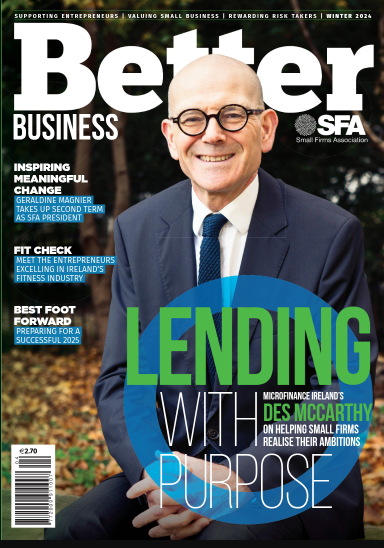Recently elected to a second term as Chair of the SFA, Ger Magnier is looking forward to another two years to continue her hard won momentum on projects and initiatives.
In her day job, Magnier is co-founder and director or Idiro Analytics, a pioneer in the field of advanced analytics and AI. In 2021 she co-founded the Idiro Analytics Ethics Centre, a visionary initiative that aims to foster collaboration across industry, academia, and government, to ensure that AI technologies are human-centred, fair, and trustworthy. She is passionate about nurturing the adoption of inclusive AI that benefits all sectors of society and has high hopes that small business owners in Ireland can use it to create efficiencies that help level the playing field for them.
“We’ve been in AI, analytics and data for over 20 years. One of the things I observed was that the efficiencies that investment in AI or analytics can create in businesses tended to be the preserve of larger businesses. My ambition when I came in was to digitise a lot of small businesses and help them on that journey,” she says, reflecting back on the goals she began working on in her first term.
“Small businesses around Ireland needed more than just a web presence, they needed to look at their own digital transformation journey in order to remain competitive, and also with margins getting tighter, they needed to create more efficiencies.”
At the beginning of that first term, there was a lot of talk about “dual transition”, both environmental and digital, but she feels “neither of the two happened as fast as was hoped”. “When ChatGPT came to market it ended up opening up AI, and making it more accessible to everybody, which was great.”
However, she was surprised at the lack of uptake on AI by small firms, even though it holds so much potential for businesses without their own IT departments. “It shouted out to me that there was a larger problem that’s systemic, that we’re not really understanding what’s going on with small business.”
She concluded that small business owners were “punch drunk” after a seemingly endless barrage of blows to deal with – GDPR, Brexit, Covid, the energy crisis. The cumulative effect of these crises has left small businesses firefighting and unable to focus on improvement. “I realise now it’s not what you can bring to small businesses. A lot of it is down to their own absorptive capacity to be able to avail of, for instance, new technologies.”
Governance and regulation are also putting additional onerous demands on small business owners. “They don’t have the ability, the departments, the scale, within their resources to deal with all of those demands.” Even well-intended government supports are often blunt instruments that not every business can avail of, and Magnier sees her role as vital to lobby and help shape future policy.
“Having spoken to the Government over the last two years, I think the message is finally hitting them as to one size cannot fit all when you’re offering supports.” One such example, where the criteria were exclusionary to many businesses was the Increased Cost of Business (ICOB) grant; the Government signed off on a package of €257 million in Budget 2024 as a once off grant payment, seen as a vital measure for small and medium businesses, to be rolled out via local authorities. The grant was based on the value of the Commercial Rates bill received by an eligible business in 2023. “It wasn’t a targeted approach and therefore many businesses couldn’t avail of the support – if you are a small company that is working from home, or if you’re a small company that’s working in a hub, or if you’re in a serviced office, for example, where you may have your own floor but you’re not you’re not paying rates.”
She has firsthand experience from her own company, of the difficulty of even tracking down the real owner of their office, which turned out to be a wealth management company, not the landlord they dealt with.
Areas like this are where she feels the power of being part of an organisation like SFA comes from, so she can, on behalf of members “bring back from what’s happening on the ground so as to try and shape different policymaking and approaches for small business”.
Another initiative which she hopes will make a big difference over the next year is a Large Business Stretch Pledge to help small businesses through partnerships with large businesses.
“There are a couple of really big bottlenecks coming down the track for businesses,” she explains. “Trying to find a way, as a small business, to become a supplier to a big company is becoming more intricate.”
To this end, the SFA is partnering with Ibec on the Large Business Stretch Pledge, to encourage large businesses to make their supply chains more diverse and to include smaller businesses.
“If we look to what has been achieved under diversity and inclusion because large businesses have set about making it happen—now we’re going to do the same around supply chain.” As the saying goes, what gets measured gets done, and she looks forward to seeing the results next year. “By the end of 2025, halfway through my next new term, I will be able to have figures on how much money has been put into the small business ecosystem as a result of just that initiative alone through the SFA, and that’s very important to me.”
Seeing this project come to fruition is one of the reasons she was delighted to be invited to consider running for election for a second term as Chair. “I was thrilled because it means I can ensure some of the initiatives that I kicked off in my last term will come to fruition in the next term.”
Hand in hand with this initiative goes another project that she hopes will significantly impact small businesses. She says the onerous nature of the CSRD reporting requirements for small businesses are, “another thing that is going to add to the cost of doing business…it’s not only time-consuming, but it’s exceptionally complex.”
While a small business may not technically fall under the scope of CSRD, “they must comply to de-risk being sidelined in supply chains.” To help small businesses deal with this, the SFA has partnered with EcoEasi, an AI-powered platform simplifying ESG reporting, to help members comply with CSRD requirements. Use of the platform will be available to SFA members as part of their membership. She is delighted to be able to offer this to members, to “take that cost away from small business and allow them to continue to enter tenders and not forfeit any revenue streams just because they’re they don’t have their figures around CSRD done.”
Another issue that Magnier considers vitally important to drive the conversation around is the social impact of small businesses as key players in community stability. “I believe we don’t talk enough about the social impact and that small businesses are key players as community level economic stabilisers.” Under the ESG banner, environmental and governance metrics are more easily measured, but not social impact. “If we did have that measurement, we would really realise the value of our small businesses across the country.”
During the summer of 2024, the SFA undertook an outreach to all 949 county councillors across the 26 counties to take the temperature of issues at a regional level, “by talking to the councillors on the ground who are going up and down their own streets and talking to their own local people the whole time.” No prizes for guessing that housing was top of the list in every corner of the country. “I think probably the biggest problem we have is that we never realized how much our population would grow, either organically or through immigration. We never knew it was going to be this, this big, this fast. And that’s one of the things that’s managed to create a lot of problems for us as well around transport.”
Another worrying trend is that women are increasingly having to step out of the workplace due to childminding issues. “It feels like a regressive move, considering how progressive Ireland is around parity and equity in the gender,” she says. “It generally is women. Before, I used to be nervous about saying that, because I’ve tried to be quite inclusive of different arrangements and families, and I try to avoid being anecdotal about it, but, as the longitudinal studies continue, the evidence is suggesting that it is women predominantly that are affected by this.”
The impact of flooding on certain parts of the country was another huge issue. “Some of these floods have decimated business and stocks, and it’s taking them a long time to replenish it, and it means a lot to small businesses.” She is passionate about the importance of recognising the personal impact of business decisions on owners and their families and calls for more sensitivity towards small business owners.
“In my chairship – chairwomanship – I really want to drive home the message that small businesses aren’t just a separate entity… but actually the name over the door or the person behind that business, it is affecting their family and their community if things are going right or wrong.”
She points to numerous cases of small businesses borrowing from friends and family just to stay afloat in the last few months. “I really want to emphasise the social and the personal aspect of this. When we talk about sustainability, I look at it not just around the environment.”
Magnier subscribes to the notion of a treble bottom line: people, planet and profit. “As Chairwoman of the SFA, want to emphasise, more than anything, the people behind the business. Stop making it an object. It is very, very personal. It is a person that is trying to pull this off. “By creating critical mass in a membership base, it means that our voice is heard when we go to talk to different groups, be it agencies or ministers,” she says. “It’s not just anecdotal evidence. We have the stats. The membership is really important for making impact, not just influence, but real impact for everybody.”




